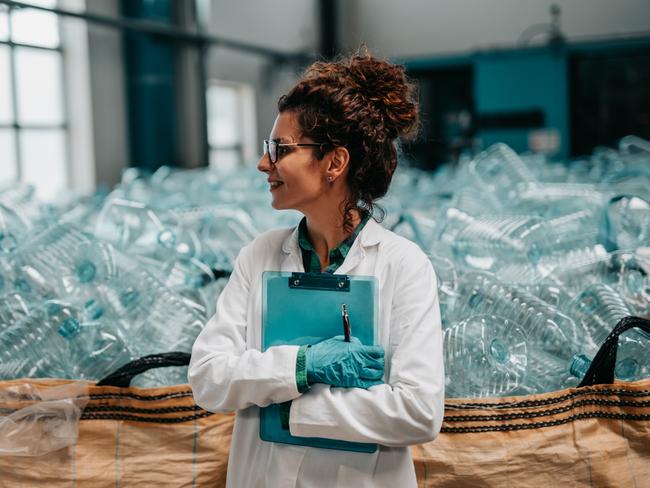Circular economy tipped to create tens of thousands of jobs in Australia
Workers from a range of professions will be needed to fill a raft of new job openings forecast for Australia in the coming decades. Find out if you could be eligible.
Careers
Don't miss out on the headlines from Careers. Followed categories will be added to My News.
Tens of thousands of new jobs are set to be created by Australia’s circular economy, amid an increased focus on reducing waste and preserving resources.
Experts say a massive reskilling effort will be required to prepare Australians for the roles, which will range from entry-level to tertiary-qualified positions, and a suite of new training courses are expected to soon be unveiled.
Initial estimates by KPMG in 2020 suggested the circular economy – whereby products and materials are reused and recycled to avoid becoming waste – would create 17,000 full-time jobs in Australia by 2048.
But sustainable resource management company Veolia, which is seeking 1000 circular economy professionals, says current projections show the employment opportunities will be far greater.
“It takes eight times more jobs to recycle a water bottle rather than send it to landfill,” says Veolia ANZ chief executive Richard Kirkman.
“Veolia estimates that in Australia it corresponds to 25,000 jobs.”

Opportunities available
Australia’s circular economy has lagged behind much of the rest of the developed world. But recent trade agreements have required the nation to commit to more sustainable practises.
Experts say the requirement, as well as a national target to achieve an 80 per cent resource recovery from all waste streams by 2030, is seeing momentum build towards a circular flow model.
Kirkman says while engineers and technicians will make up a large part of the circular economy workforce, there will be enormous opportunities for those from other professions.
“This reaches every part of the supply chain, all the way from raw materials through to manufacturing and retail,” he says.
“I need people that can build things and make machines work. But (there’s) also (a need for) marketers and lawyers and PR people.
“It’s right the way through from apprentices in all disciplines – it doesn’t have to be tech – to people in administration and payroll.”
Workers from the petrochemicals and resources sector have skills that easily transfer to the circular economy, Kirkman says, and have subsequently been in high demand.
“They were using coal as fuel and now they’re using waste as a fuel – but it’s exactly the same technology,” he says.
“We do need to solve climate change. We know it has a higher cost not to do that than to do something.
“I’m really excited (by the employment opportunities available). This is an opportunity that’s not going to go away.”
Making a difference
Metallurgical engineer Craig Johnston is among those taking up the opportunities presented by the circular economy.
The former steel and coal worker is now employed as an industrial manager at Veolia, helping BlueScope Steel – where he previously worked – adopt more sustainable practices.
“With the whole global warming, greenhouse gas and de-carbon piece, I just saw that coal mining wasn’t going to be the future,” Johnston says.
“But this sector – the recyclable, renewable and carbon offset stuff – is just growing exponentially and there’s a long future here.
“We have seen more growth in this area in the last three to four years than we have over the last 100 years and there are just so many future prospects.”

‘Real transformation’
As the circular economy picks up pace, those with trade skills will be particularly sought after, says Circular Australia chief executive officer Lisa McLean.
“We can’t keep throwing stuff away,” she says. “So bringing back all those skills of repair is going to be colossal.”
McLean says manufacturing capabilities will be especially important, including the re-manufacturing of old items into new products.
There will also be an increased focus on sustainable design, she says.
“Design is so important in the circular economy because things have to be made differently – they have to last longer and be repaired,” she says.
“This represents a real transformation in how we are consuming things at the moment. Arguably, you could say it will touch on everything (all employment sectors).
“There’s going to be a lot of circular economy jobs. If you Google it on (job website) Seek, there’s already a lot of them out there.”
Skills delay
Acquiring the skills to work in the circular economy, however, is posing a challenge.
To date, circular economy-specific training is only offered through micro-credentials – mostly online from overseas training providers, McLean says.
“We have got a lot of skilling up to do,” she says. “We don’t have the skills we need so there’s a huge opportunity for manufacturing skills and technology.
“Training is something that we (Circular Australia) are moving to do and the unis will also start to offer more training in the circular economy.”
In the meantime, Kirkman suggests undertaking courses in sustainability are an appropriate alternative to holding a circular economy-specific qualification, as is knowledge of the environmental impacts of the particular industry someone is currently employed in.
The priority roles in a circular economy:
• Renewables specialists (mechanical and electrical engineering)
• Sustainability specialists
• Environmental advisors
• Lawyers with experience in ecological transformation
• EV mechanics
• Energy from waste specialists (including plant managers, electrical and instrumentation specialists)
Source: Veolia


